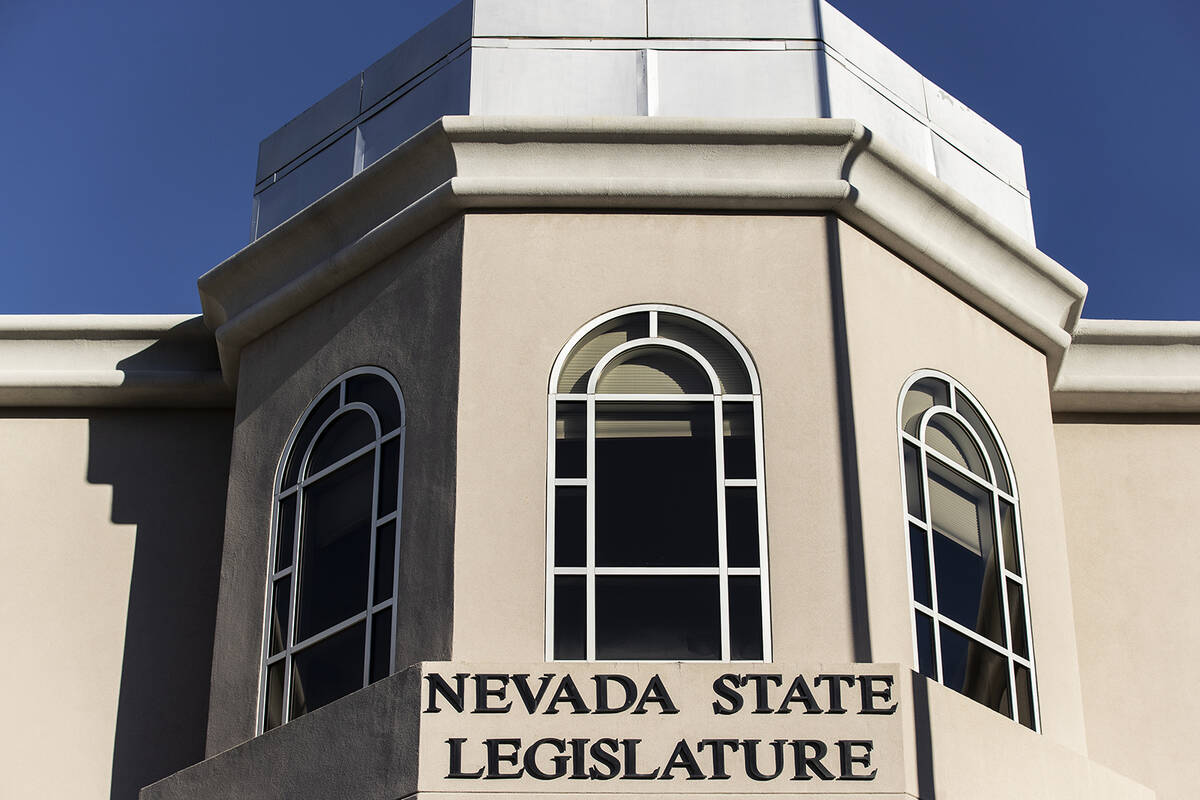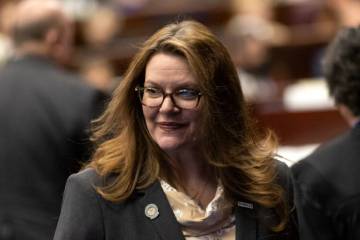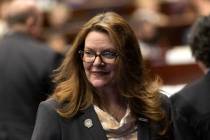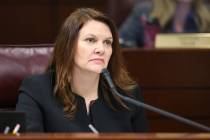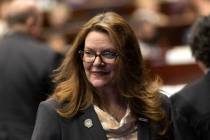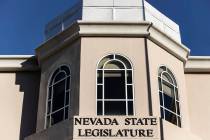Democrats, governor get key legislative priorities approved
CARSON CITY — It was a legislative session whose sun rose with new leadership — from the halls of the Legislature to the governor’s mansion — and set with a record number of vetoes.
First-term Republican Gov. Joe Lombardo and lawmakers approved consequential legislation, enacting the largest K-12 education budget in the state’s history, hammering out a deal to bring the Oakland Athletics to Las Vegas and clearing the way for state employee raises.
But the end of the session was anything but smooth sailing. Lawmakers returned to the building for a special session hours after Republican senators voted to reject a key budget bill funding capital improvement projects just before the regular session adjourned.
And last-minute bargaining between the governor’s office and Democratic leadership left massive proposals — including public funding for a $1.5 billion baseball stadium and a more than $4 billion film tax program — floating by the wayside, waiting to be risen from the dead by the hand of their own special session.
At least one of those came to fruition. Just two days after the regular session’s June 5 adjournment and just one day after the state’s shortest special session, lawmakers returned to the building to eke out a deal to bring the A’s to Sin City.
After being amended to specify the boundaries of a special tax district where the stadium will be built and clarifying requirements for community benefits, the bill was approved by lawmakers and sent to Lombardo, who signed the legislation on June 15. Votes in the Senate and Assembly were bipartisan in both support and opposition.
In all, more than 530 bills were signed into law, with both lawmakers in the Democratic-controlled Legislature and the Republican governor clinching key policy goals.
Lombardo’s priorities
Just one of Lombardo’s five bills failed to survive the legislative process, with the remaining four receiving floor votes in the final days and hours of the regular legislative session.
Assembly Bill 400, the governor’s sweeping education proposal, was passed after portions of the bill, including a provision that would have increased funding for Opportunity Scholarships, were taken out. The bill authorizes a city or county to sponsor a charter school, creates the Early Childhood Literacy and Readiness Account, restores the Read by Grade 3 program and provides funding for transportation for charter school students.
Lawmakers also approved an amended version of Senate Bill 431, which will allow the appointment of a chief innovation officer for the state and raises the cap on the state’s rainy day fund from 20 to 26 percent. Lombardo originally requested that cap be raised to 30 percent.
The Legislature also voted to approve the governor’s crime-related legislation with much of the bill’s language gutted by an amendment. The bill, which would have implemented harsher penalties for some crimes, was amended to include an appropriation to the Department of Public Safety for two fentanyl-testing machines.
A pair of school safety bills, including Lombardo-backed Assembly Bill 330 and Assembly Bill 285, sponsored by Assemblywoman Angie Taylor, D-Reno, were approved by the Legislature and signed by the governor.
“We’re really proud of what the governor was able to accomplish in his first legislative session,” said Lombardo Chief of Staff Ben Kieckhefer. “He got four of his five bills passed, including his top priority, which was school safety.”
The remaining bill, which would have made several changes to elections, including requiring an ID to vote, died after lawmakers declined to act on it.
And though Democratic lawmakers rejected the governor’s firm push for Opportunity Scholarship funding, Kieckhefer said the session proved Lombardo is willing to “draw a hard line when it’s necessary.”
“I think he proved himself to be a governor who will keep his word, who will draw a hard line when it’s necessary, but also understands the pragmatic approach that is necessary to working across branches of government and working across political parties,” Kieckhefer said.
Democrats’ goals
Lawmakers in the Democratic-controlled Legislature sent hundreds of bills to the governor’s desk, including the five state budget bills. Notably, lawmakers passed, and Lombardo later signed, a massive spending plan with more than $11 billion for K-12 schools over the next biennium.
“I think that’s such a huge, and cannot be overstated, accomplishment from this legislative session,” Senate Majority Leader Nicole Cannizzaro, D-Las Vegas, said of the bill.
Lombardo also approved a Cannizzaro-sponsored bill to codify protections for out-of-state abortion patients.Senate Bill 131, which bars any Nevada agency from cooperating with authorities from states who seek to prosecute those who travel to Nevada to get an abortion, codifies an executive order issued by former Gov. Steve Sisolak.
Senate Bill 163, which requires public and private health insurance plans to cover the treatment of conditions related to gender dysphoria and gender incongruence, was also approved by lawmakers and signed into law by Lombardo.
And a last minute measure sponsored by Assembly Speaker Steve Yeager, D-Las Vegas, a bill to create a program for homelessness assistance with matching funds up to $100 million, was passed and signed into law.
Lawmakers also passed Senate Bill 35, a bill changing amounts related to fentanyl trafficking charges.
Other measures
Measures to end a COVID-era requirement for daily room cleanings, make Juneteenth a state holiday and change the cap on awards in medical malpractice lawsuits were among the hundreds of other bills signed into law.
After days of behind-the-scenes negotiations and multiple amendments, lawmakers approved Assembly Bill 404, which raises the current cap on medical malpractice awards from $350,000 to $750,000. The bill was signed into law by the governor.
Lombardo also approved Senate Bill 441, a contentious bill ending a COVID-19 era requirement for daily hotel room cleanings, and Assembly Bill 140, which makes Juneteenth a state holiday.
Assembly Bill 448, which closes a tax loophole, was also signed into law. The measure was introduced after a Las Vegas Review-Journal investigation revealed big property tax owners frequently avoided transfer taxes on big sales.
Record vetoes
Not all legislative dreams perished behind deadlines or on committee chairs’ desks; 75 bills died by the governor’s stamp, earning Lombardo the record for the most bills vetoed in a single session.
Of those bills, 42 bills had at least one Republican lawmaker vote yes on the measure, and seven were either primarily sponsored or co-sponsored by a Republican.
Among those were a handful of bills related to tenants’ rights and eviction reform, a move that drew concern from groups like the Nevada Housing Justice Alliance and the Legal Aid Center of Southern Nevada. One of those bills, Senate Bill 355, would have halted evictions for renters who have a pending rental assistance application.
In his veto message, Lombardo said the measure would make the eviction process “more time consuming” and “costly.”
And the governor rejected scores of other measures too, including some related to elections. Vetoed legislation included bills that would have required ballots to be counted by machine, would have required election materials to be printed in languages other than English and would have required inaugural committees to report donations of $1,000 or more.
Other failed bills include those that would have capped the price of certain drugs to rates negotiated by the federal Department of Health and Human Services and a bill that would have allowed terminally ill patients over the age of 18 with less than six months to live to end their lives with legal drugs prescribed by a medical practitioner.
In his veto message, Lombardo said he wasn’t “comfortable supporting” the medical aid in dying measure.
“Expansions in palliative care services and continued improvements in advanced pain management make the end-of-life provisions in SB 239 unnecessary,” Lombardo wrote.
The governor also vetoed a trio of firearms-related bills prior to the end of the regular session. In a statement, Lombardo said the bills were “in direct conflict with legal precedent and established constitutional protections.”
Lombardo additionally quashed a bill that would have funded universal lunches at K-12 schools, raising concerns that the policy could increase food waste in school cafeterias. And he vetoed Senate Bill 340, which would have required school districts to submit a plan to provide summer school to students in all grades during 2023 and 2024.
In his veto message, Lombardo said the bill was “well-intentioned” but said it lacked a mechanism to fund such plans.
Cannizzaro slammed the governor for many of those vetoes.
“There’s good pieces of legislation that received a lot of support across the board that were well balanced, and then were vetoed,” she said. “To me that doesn’t speak to responsibility. That speaks to maybe a political interest. I can’t explain why things like summer school or school lunches, or ensuring that people can continue to live in their houses or making sure that people can afford their prescription drugs are things that we are vetoing especially when the policy was worked on so significantly.”
But Kieckhefer said the governor used his veto power to protect “the best interests of the state.”
Lombardo is “not shy about using the authority of the governor to hold the line on policies that he thinks are in direct conflict with the best interests of the state, whether that is efforts to erode individual liberties, intervention into business practices, or overstepping what the role of government should be,” Kieckhefer said.
Contact Taylor R. Avery at TAvery@reviewjournal.com. Follow @travery98 on Twitter.



